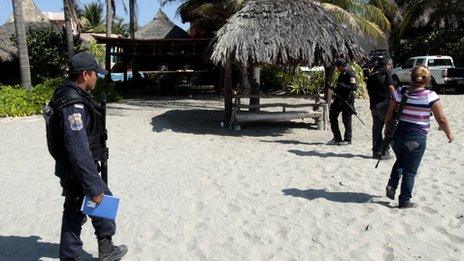Mexican rapes: 'I wish I didn't know the details'
- Published

Police are searching for masked gunmen who raped six Spanish women in a rented beach house near the Mexican holiday resort of Acapulco, after tying up their Spanish male companions. It's a crime that has shocked many who thought they knew Mexico well.
Even in a country where brutality has become the norm, this story hit many people hard.
I think it was the inherent familiarity of the sort of trip the group of tourists were on.
In fact, they were not exactly tourists, rather young expats trying to make a future for themselves in Mexico City.
Like so many people do in this country, the group of 13 friends decided to make the most of the Bank Holiday weekend - or puente as it is called in Latin America - by heading down to the beach.
They had hired a house near Acapulco, in a place called Playa Bonfil, probably the nearest decent coastal zone to Mexico City, where the chaos of the capital can be escaped for a few days.
Later, pictures of the house they had stayed in appeared in the press. Somehow the rooms seemed very familiar. The 1970s decor and cheap artwork on the walls reminded me of 100 different rooms I have stayed in - sometimes in beach resorts - in Mexico and Central America.
But these photos showed the signs of a struggle - pillows tossed to one side, mattresses stripped of their bedclothes, cigarette butts on the floor where the armed men had discarded them as they carried out their acts of violence.
Mexico City is huge, but the Spanish community here is relatively small.
There are only about 90,000 Spaniards in the whole country.
I met one of the young Spanish lads who was there, in the beach house at Acapulco that night. Helpless, his hands tied by a mobile phone cord, he watched the horror unfold in front of his eyes.
And a friend of mine was supposed to go on the same beach trip. The fact that - at the last minute - she had to work that weekend, may have saved her from an experience from which she might never have recovered.
So these friends were simply relaxing at the house late on Sunday night when hell was unleashed.
I know details about this story I wish I didn't. I know things that are keeping me, and the others who know them, awake at night and preying on our minds.
One can only imagine what it is doing to those who lived through them.
Acapulco is, of course, famous as the getaway of the Hollywood stars of the 1940s and 50s. A hotel owned by Tarzan the Ape Man, Johnny Weissmuller, was regularly frequented by John Wayne, Errol Flynn, Cary Grant and Tyrone Power.
More recently, as the drugs war in Mexico has intensified, this resort and its surrounding beaches have generally been seen as safe. I stayed in a house near the famous Acapulco cliff divers in 2005 just as the violence in the region was beginning, and I wondered what all the fuss was about.
When friends of mine came to visit last year, we drove down to the Pacific coast.
By mistake we came off the road too early, before Acapulco, and found ourselves in the mountains of Guerrero state. Rather than turn round, it seemed quicker and easier to keep driving. The road would eventually reach the coast again, and we would be on our way again.
As night fell, suddenly that did not seem such a great idea after all. I was all too aware of the drug gangs operating in Guerrero, where much of the marijuana and methamphetamine trades are controlled. And the idea of being foreigners caught with a broken-down car on the potholed village roads did not appeal at all.
"Wow, man! Did you see that massive mansion by the side of the road?" my friend from London said incredulously. "What's it doing in the middle of all these shacks?"
A narco-mansion, paid for by drug money, was a timely reminder to get off that road as soon as we could.
We were lucky. By 21:00 we were back on the coast, safe in a hotel a stone's throw from the beach.
But, and here's the rub, we were just a few hours south of Playa Bonfil. No doubt the 12 Spanish tourists, and the Mexican girl accompanying them, had felt safe in their rented beach house too. No doubt they had told their friends and family back home - as I have time and again - that generally things in Mexico aren't too bad, that the risks sound worse than they are.
The Spanish community in Mexico City is in shock right now.
I had a beer with my friend Jacobo, the correspondent from the Spanish newspaper El Mundo, two days after the attack. He had barely slept and was on his way to Acapulco the following morning to cover the story. "I've been here almost 11 years," he said, "but today I'm seeing Mexico through new eyes."
How to listen to From Our Own Correspondent:
BBC Radio 4: Saturdays at 11.30am and some Thursdays at 11am.
BBC World Service: Short editions Monday-Friday - see World Service programme schedule.
- Published6 February 2013